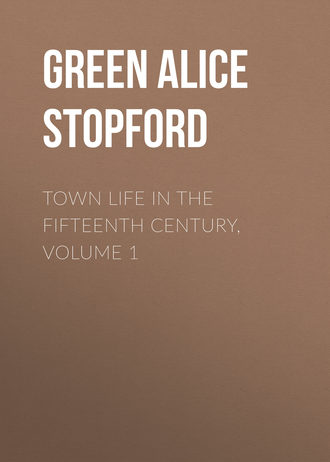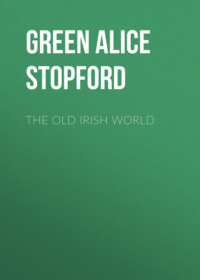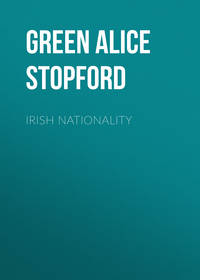 полная версия
полная версияTown Life in the Fifteenth Century, Volume 1
481
Berkeleys, i. 167.
482
John of Gaunt retained Rankyn d’Ypres to dwell with him for peace and war for the term of his life, granting him board and twenty-five marks a year from the ferm of Liverpool, in time of peace. (Picton’s Municipal Records of Liverpool, i. 16.) For the management of a great house with the giving out of wool for spinning and weaving and accounts audited by a master clothier, see Berkeleys, i. 167; Hist. MSS. Com. v. 330; Denton’s Lectures, 293; Paston, ii. 354-5; Hist. MSS. Com. x. 4, p. 297. Often they supplied their own livery. (Brinklow’s Complaynt, 45; Paston, ii. 139.)
483
Lives of the Berkeleys, ii. 63.
484
Plumpton’s Correspondence, 13, 20-1, 41, 71, 72, 97, 99, 148, 194, 206, 187, 198-9. The abbot of Fountains had to write a severe letter to order that a wine-seller in Ripon shall be paid for a tun of wine. (Ibid. 62.) For courtiers who “paid on their pawns when their pence lacked,” Richard the Redeless, Pass. i. 53-4; Paston Letters, ii. 333-5, 349-50; iii. 99.
“Butt drapers and eke skynners in the townFor such folk han a special orisonThat florisshed is with curses here and thereAnd ay shall till they be payd of their here.”Book of Precedence, Early English Text Society, 107.485
Paston Letters, iii. 326, 194, 219, 358.
486
Ibid. iii. 6-7, 20, 23, 24, 35, 46, 49, 114-5, 219, 258.
487
Lives of the Berkeleys, ii., v.; Brinklow’s Complaynt, 40.
488
Richard the Redeless, Pass. iii. 172.
489
Berkeleys, i. 159.
490
Lives of the Berkeleys, i. 130. A charter given by Baldwin of Redvers to Plympton, 1285, grants the same rights as the citizens of Exeter had from the King, except that Baldwin’s serfs, if they lived in the borough, might not be granted its liberties without his leave. (Madox, Firma Burgi, 42.) The King could grant a number of privileges which were beyond the power of any other lord – such as freedom from tolls throughout the kingdom, exemption from the sheriff’s jurisdiction, freedom from interference of royal officers, and so on; and the matter of tolls was so important that towns on private estates were practically obliged to get a royal charter as well as a charter from their lord. Compare the charters given in Stubbs’ Charters, 105; and Gross, ii, 136; with royal charters such as those in Stubbs’ Charters, 103; and Nott. Rec., i. 1. See also Hist. MSS. Com. ix. 273.
491
Berkeleys, i. 341.
492
Berkeleys, i. 226, 228.
493
Ibid. i. 183-185.
494
Ibid. i. 227.
495
Plumpton’s Correspondence, 1-li.
496
Berkeleys, i. 233-236, 272, 280. Compare the story of Sir William Plumpton, who fought at Towton on the losing side. He was brought before the chief justice in York and gave a bond for the payment of £2,000 before next Pentecost, and failing to procure it had to give himself up a prisoner at the Tower. He obtained a pardon, was released from his bond in 1462, and had new letters of pardon in 1463, but was still unable to return home till 1464, after he had been through a new trial and been acquitted. (Plumpton’s Corres. lxvii-ix. 30.)
497
Freeman’s Exeter, 166-7.
498
Berkeleys, ii. 95. Compare the expenses of Fastolf in a lawsuit of ten years, the costs of which were recorded in a roll of seven skins. (Hist. MSS. Com. iv. 1, 461.)
499
Berkeleys, ii. 65-73, 75, 84, 103-116.
500
Freeman’s Exeter, 164; Paston, i. xcviii, 350-1; Proceedings of the Privy Council, v., xc-xci.; vi. lxxviii-ix. In 1437 a commission of inquiry into felonies and insurrections in Bedford could not be held because Lord Grey, to whom the town belonged, appeared with a strong armed force, and was met by Lord Fanhope ready to oppose him with another army. (Proceedings of Privy Council, v., Preface xv-xvi.) Account given by witnesses before Privy Council, v. 35, 39, 57. Fresh troubles in 1442, v. 192.
501
For the evils of liveries and maintenance under Richard the Second, see Richard the Redeless, Pass. i. 55 &c., ii. 74 &c., iii. 309 &c. The wearing of liveries was forbidden in Shrewsbury lest “when any affray or trouble fall in the said town each man having livery would draw to his master or to his fellow and not to the bailiffs.” (Owen, i. 217.) From the towns these evils seem to have been rigorously and effectually banished by ordinances from 1309 (Freeman’s Exeter, 165, 143) throughout the two following centuries. (Hist. MSS. Com. v. 557; Eng. Gilds, 385, 388-9, 393, 333; Hist. MSS. Com. xi. 3, page 16.) The cases of trouble which occur are rare. (Nott. Records, ii. 384; iii. 37, 344-5. Hist. MSS. Com. viii. 415. Hunt’s Bristol, 103-5.)
502
Leicester shows the comparatively slow growth of freedom in one of the most favoured towns dependent on a great lord. Its great charter given by Edmund Crouchback in 1277, and translated into English under Henry the Sixth, was mainly concerned with the ordering of legal procedure for the burghers; and it was not till 1376 that the town bought from its earl the right to appoint its own bailiff, and to receive the annual profits of its courts, and various other dues and fines. The town property was simply a tenement, a chamber, and a small place yielding a few pence yearly till 1393, when it was allowed to hold a little property for the repair of the bridges; and not till 1435 were the mayor and the corporation given the right to acquire lands and rents for the sustenation of the town and mayoralty. (Hist. MSS. Com. viii. 404, 412, 413, 414. Thompson, Mun. Hist., 74. A pamphlet on the Origin of the Leicester Corporation by J. D. Paul gives a translation of Crouchback’s charter.) Doncaster belonged to the family of De Mauley till the middle of the fifteenth century, when it passed for a few years to the Duke of Northumberland, and in 1461 was taken into the possession of the Crown. Edward the Fourth made it a free borough and gave it a common seal. Henry the Seventh in 1505 granted to the corporation all the property which the Crown had acquired at Doncaster on the attainder of Percy in 1461, and for a yearly rent of £74 13s. 11½d. secured to it the rights which had belonged to the ancient feudal lords. (Hunter’s History of the Deanery of Doncaster, i. 13-15.)
503
Picton’s Municipal Rec. of Liverpool, i. 1-4.
504
Picton’s Municipal Rec. of Liverpool, i. 5-7.
505
Ibid. 13, 14, 16. From this time leases of the ferm were very numerous and were constantly granted to one or more individuals; between 1354 and 1374 Richard de Aynesargh and William Adamson, who were often mayors, took such leases for several terms. (Picton’s Memorials of Liverpool, ii. 54.)
506
Picton’s Mem. of Liverpool, i. 35-36.
507
Ibid. i. 27-28.
508
In 1413 the burgesses presented a petition complaining that their privileges were infringed upon by the shire officers coming into the borough and holding courts by force, by which “the said burgesses are grievously molested, vexed, and disturbed, to the great hindrance and detriment of the said borough and the disinheriting of the burgesses.” It was declared on the other side, that the mayor and bailiffs had held the King’s Courts without authority and received the tolls and profits. It is not known how the case ended. Ibid. i. 31-2. Picton’s Mun. Records, i. 20.
509
The revenue from Liverpool in 1296 was £25: it then had 168 inhabited houses. (Picton’s Mem. of Liverpool, i. 20.) In 1342 the personalty of the burgesses taxed was £110 13s. 3d., that is, the average personalty of each was about one mark (25). The revenue in 1327 was £30; in 1346 it was £38 (26), and remained the same in 1394 (31). In 1444 it was reduced to £21; in 1455 to £17 16s. 8d.; and under Edward the Fourth to £14 (36-7). In 1515 an inquiry was made as to the decay of the revenue (38), and the Act of 1544 put Liverpool in the list of towns which had wholly fallen into decay (45). Two plagues, one in 1540, another in 1548, probably carried off half its population (47); and in 1565 it had but 138 inhabited houses, and probably seven or eight hundred inhabitants, and twelve vessels navigated on an average by six men each (55). There were five streets under Edward the Third, and seven under Elizabeth (62).
510
Fortified in 1406. Picton’s Mun. Records, i. 21, 22.
511
A little thatched building in the High Street which had to serve as toll house, town hall, and gaol, but the greater number of criminals were imprisoned and judged in the Stanley and Molyneux Castles. Picton’s Memorials, ii. 25-6.
512
Picton’s Mem. of Liverpool, i. 32-3.
513
Picton’s Mem. of Liverpool, i. 36, 37.
514
Ibid. i. 37, 38, 46, 48-9.
515
Picton, i. 63.
516
As an illustration of the reverse process, showing the impulse given to municipal liberty when a borough was transferred from private ownership to the State, see the case of Sandwich (Ch. XII.).
517
See charter to Beverley; Stubbs’ Charters, 105; Lambert’s Gild Life, 73-6, York; Stubbs’ Charters, 304, Salisbury; Gross’ Gild Merchant, ii. 209-10.
518
Pol. Poems and Songs (Rolls’ Series). Ed. Wright, i. 327, 334.
519
The Bishop of Salisbury by a royal charter of 1304 got the right to tallage the townspeople of Salisbury, while the burghers were given municipal privileges the same as those of Winchester. In 1305, however, the burghers, rather than pay tallage to the bishop, surrendered their municipal privileges to the King, and promised to give up to him their common seal. (Rot. Parl. i. 174-6.) But in the composition made the next year between the lord bishop and the citizens, those who had shared in the revolt and had not made their submission were utterly separated and removed from privileges of trade or government. (Gross, ii. 209-10.) In 1396 there was again a quarrel between the bishop and the citizens, and the case was carried to the King’s Council, when the mayor and commonalty entered into a recognizance to the King in £20,000 to behave well to the bishop, and two hundred of the citizens entered into recognizances to the bishop, each one in the sum of £1,000. In the agreement, however, certain provisions were made to prevent the ecclesiastics from taking advantage in any way of this treaty. (Madox, 142.)
The Commons in giving the grant of 1435 pray that no prelate may be a collector, adding that the dioceses of bishops and the neighbourhood of abbeys were greatly oppressed by ecclesiastical lords. (Rogers’ Agric. and Prices, iv. 164.)
520
Our Borough, by E. M. Beloe, 1-3.
521
Hist. MSS. Com. xi. part 3, 185-6.
522
For the troubles of the mayor and community in trying to carry out the King’s laws in the presence of this divided jurisdiction, see Rot. Parl. i. 331.
523
There had been trouble the year before which Robert’s soft words failed to dissipate. “Know, dear friends,” he writes, “that I am surely concerned for your trouble, and if I could give you ease or alleviation of your trouble I would do it most readily, but assuredly, dear friends, I am at present in such misfortune of money that … wherefore I pray you, my dear friends, that you put me in possession of my moneys as speedily as you can, since of a truth I can no longer dispense with them which much troubles me. And with respect to the wrong that was done to my bailiff, you have sent me word that the parties are in agreement. Know you that though peace be made between them the contempt done to me is not redressed, wherefore, I pray you, dear sirs, that you will take order amongst yourselves that amends may be made to me for the aforesaid contempt. Adieu, dear friends! May he give you happy and long life!” Hist. MSS. Com. xi. part 3, 241-4.
524
For the King’s bailiffs, see the petition in 1382 to the Lord Chancellor for relief from extortionate demands of the bailiffs of the Tolbooth. The bailiffs were perhaps not to blame; in 1396 and 1397 they had to pay 20 marks of silver out of receipts to the Duke of Britanny; in 1398, 10 marks to the Duke of York; in 1400, 8½ to the Duke of Lancaster. Ibid. 244-5.
525
The charter of 1268 granted the right to elect a mayor in accordance with the former charter of the bishop. Hist. MSS. Com. xi. part 3, 186, 246; Gross, ii. 158.
526
Gross, ii. 165.
527
Gross, ii. 155; Paston Letters, ii. 86-7.
528
Gross, ii. 155-6.
529
See Vol. II., Chap. XIV.
530
Blomefield, iii. 163.
531
In 1403. Blomefield, viii. 531.
532
Proceedings of Privy Council, vol. i., 167 (1401).
533
Hist. MSS. Com. xi. 3, 186-7. In 1307 the mayor and community got a grant of land from the bishop for their basin for water. Ibid. 239.
534
Hist. MSS. Com. xi. part 3, 240.
535
Ibid. 213-215.
536
A will was proved after a proclamation by the serjeant that on such a day it would be read in the Guild Hall before the mayor, and anyone who wished to contradict it must then appear. (Hist. MSS. Com. xi. part 3, 153, 189.) In the earliest wills no mention is made of probate before the ordinary; in later registrations it is recorded that the will had received episcopal probate before coming before the mayor. (Ibid. 155.) The cost of this was what the people desired to avoid.
“For who so woll prove a testament,That is not all worth tenne pound,He shall pay for the parchmentThe third of the money all round;”– Pol. Poems and Songs, ed. Wright, i. 323.537
Hist. MSS. Com. xi. part 3, 207.
538
Ibid. 205.
539
Ibid. 189.
540
Hist. MSS. Com. xi. part 3, 188.
541
Blomefield, iii. 513. Hist. MSS. Com. xi. part 3, 189, 205.
542
Blomefield, iii. 516-17.
543
Hist. MSS. Com. xi. part 3, 222. It would seem that in 1377 the mayor and burgesses were made responsible for the custody of the town, and were ultimately given power of distress for subsidies for its defence. (Ibid. 190, 205.)
544
Hist. MSS. Com. xi. part 3, 165.
545
Ibid. 225.
546
Paston Letters, ii. 86-7.
547
Hist. MSS. Com. xi. part 3, 205.
548
Ibid. 246.
549
Proc. Privy Council, i. 127. Beecham’s Hist. Cirencester, 154-8.
550
In 1333 St. Alban’s brought its charter to the King’s Chancery and renounced there all the liberties contained in the said charter. The keeper of the rolls at their request broke off the seal of wax, and cancelled the enrolment in the Chancery rolls. The townsmen also brought their common seal of silver, which at their request was destroyed and the silver given to the shrine of St. Alban. (Madox, 140.) Common as it was in France for a commune to renounce its freedom, there is scarcely any instance in England save on ecclesiastical property. The case of Dunwich was peculiar and I have met with no other.
551
Occasionally a convent drove a hard bargain. In 1440 an agreement was made between the convent of Plimpton and the commonalty of Plymouth, by which the commonalty was to pay £41 yearly, and if this rent was unpaid fifteen days after quarter day, the officers of the convent might seize all the goods and chattels of the mayor and commonalty and of any burgesses and of any others residing and abiding there which could be found within the borough and the precinct thereof. Madox, 222-3.
552
The organization of the guild does not seem to have been at all of a democratic or “advanced” kind, but after the pattern of the oligarchic societies of the time. Four men owning goods to the value of 10 marks were elected yearly, by a committee of twelve burgesses, to hold the guild, and summoned to do their duty by two officers of the guild called “les Dyes.”
553
Gross, ii. 29-36. Yates’ Bury S. Edmunds, 123-135.
554
Statutes, 6 Richard II., 2, cap. 3.
555
Coates’s Reading, 49.
556
Hist. MSS. Com. xi. part 7, 224.
557
Gross, ii. 208.
558
Coates’s Reading, 49-50.
559
Gross, ii. 202-4.
560
Some of the fines levied were doubtless used for the townsmen’s benefit. For example, there were nineteen bridges within the limits of the borough, which after the dissolution of the monastery fell into decay and were repaired in the time of Elizabeth with the stones from the abbey walls. (Coates’s Reading, 64.) But material advantages did not take the place of political freedom.
561
Gross, i., 90-1. The number of burghers in the Guild seems to have been very small. In 1486, 28 burghers paid chepin gavell; in 1487, 22 burgesses; and in 1490-93, 31 burgesses. In 1510 there were 45 burgesses. (Coates’s Reading, 58.) There were many who paid fines and dues to the abbot who were of the town and not of the Guild, and this class was doubtless encouraged by the convent, following the same policy as the bishop in Lynn. (Hist. MSS. Com. xi. part 7, 172, 175-6.)
562
The Guilds were naturally looked on with very little favour by the ecclesiastical lords in such cases. There was a conflict between abbot and town at Malmesbury in the time of Edward the First. The burghers claimed to have a Guild of their own people, who alone had a right to trade in the town, and to take certain taxes for the support of the Guild from all traders who were not of it. The abbot refused to allow them to use their rights. The town fell back on its liberties when it had been a royal borough, and appealed to the King. (Gross, ii. 173.) See also the precautions taken by the Bishop about the Guild at Salisbury. (Ibid. 209-10.)
563
Coates’s Reading, 53.
564
They got afterwards from Henry the Eighth the church of the Grey Friars for their Guild Hall.
565
Hist. MSS. Com. xi. part 7, 172-3.
566
Coates’s Reading, 53, 54. All this time matters were made easier for the townspeople by constant talk of loans to the King. In 1420 the town officers went to Wallingford to discuss the matter with the King. There was a loan made in 1430, and another in 1445. Hist. MSS. Com. xi. part 7, 173, 174.
567
Hist. MSS. Com. xi. part 7, 174.
568
Under Henry the Eighth, he received £10. (Coates’s Reading, 55, 56.) A woman of the town left three silver cups and one gilt cup for the mayoralty in 1479. Public dinners at each election began in 1492, and feasts for the burgesses at Christmas and Shrovetide. (Hist. MSS. Com. xi. part 7, 180-1, 176.)
569
Ibid. 180.
570
Eng. Guilds, 298.
571
Hist. MSS. Com. xi. part 7, 175, 180.
572
Ibid. 212.
573
Hist. MSS. Com. xi. part 7, 176.
574
Coates’s Reading, 52, 53.
575
Coates’s Reading, 54-5. Hist. MSS. Com. xi. 7, 168-9.
576
Miller’s Parishes of Worcester, vol. I. Rot. Hun., p. 282, 3 Edward I. In Canterbury there were still in 1835 not less than fifteen precincts within the limits of the corporate authority but exempt from its jurisdiction (Rep. on Mun. Corpor., 31). For crown property in York not under municipal law, see Davies’ Walks through York, 27-28.
577
Ricart’s Kalendar, 117.
578
In 1285 the Bristol charter was forfeited because of encroachments on the rights of the constable of the castle. Seyer’s Bristol, ii. 74.
579
Seyer’s Bristol, ii. 88-109.
580
Norwich Doc., Stanley v. Mayor, &c., 25. Here the fee was given to the citizens as early as 1346.
581
There were also occasional difficulties as to the jurisdiction of Bristol over the Temple fee, which first belonged to the Templars, then to the Knights of St. John of Jerusalem, and was not finally incorporated with the city till 1543. (Seyer’s Bristol, i. 134-6.)
582
In 1240 the inhabitants of Redcliffe were combined and incorporated with the town of Bristol; and the ground of S. Austin’s by the river was granted to the commonalty by the abbot for certain money paid by the said commonalty. Ricart, 28.
583
Lives of the Berkeleys, i. 177, 196-201.
584
They took to trading about 1367. Berkeleys, i. 365-6. Ibid. i. 23. Thomas Berkeley got leave from Henry the Sixth “for three of his factors to go with the ship called the Cristopher with any lawful merchandise, and to sell the same and return and go again. And the year before, this Thomas and two of his partners had the like licence to go with their ship called the Trinity of Berkeley, to Bordeaux, and there to unload and load again, and bring any merchandise into England.” Ibid. ii. 83, 136.
585
Ibid. ii. 68.
586
Ibid. ii. 113-4.
587
The new marquis was very angry at the unworthiness of such a match with so mean blood, and made it an excuse for disinheriting him. Ibid. ii. 172, 173.
588
Berkeleys, ii. 175, 176.
589
Journ. Arch. Ass. xxvii. 461.
590
Journ. Arch. Ass. xxvii. 480.
591
Ibid. 481.
592
Journ. Arch. Ass. xxvii. 467.
593
Journ. Arch. Ass. xxvii. 480.
594
Gross, ii. 265.
595
Hist. MSS. Com. vi. 601. Gross, ii. 254.
596
The bailiff of the Soke was sometimes called the Mayor of the Soke to emphasize his independence.
597




